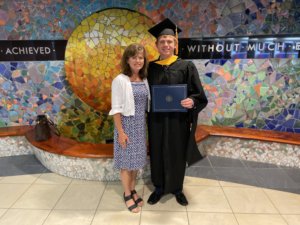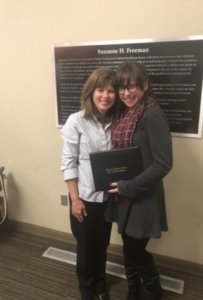For Christine Fultz, CRNA, and her family, being a Certified Registered Nurse Anesthetist (CRNA) is a family affair. Fultz has been a CRNA since 1991 and has four adult children. Two are CRNAs, and one is enrolled as a student in a nurse anesthesiology program. The youngest is a registered nurse who is considering going to graduate school to become a CRNA.
Fultz, whose mother was a registered nurse, said she never spoke to her children about becoming CRNAs or pressured them to follow in her footsteps. They all chose to become nurses on their own and go on to attend nurse anesthesiology programs — but she certainly inspired them.
“I feel honored and humbled that they’ve become CRNAs, and I’m proud of them. They’ve each had to do it on their own. These are rigorous programs, and they’re doing the hard work to get the degree and then to pass the certification exam and start working as CRNAs,” she said.
CRNA preparation requires at least seven to eight-and-a-half calendar years of education and experience. To apply to a CRNA program, a baccalaureate or graduate degree in nursing or another appropriate major is required, as well as an unencumbered license as a registered professional nurse and/or advanced practice registered nurse in the United States or its territories. All CRNAs must have at least one year of full-time work experience as a registered nurse in a critical care setting prior to applying to a nurse anesthesiology program.
Cullin Brinning, MSN, CRNA, Fultz’s son, attended this year’s AANA Annual Congress with her. He said her empathy and advocacy inspired him to become a CRNA. “When you combine her positive innate qualities with her advocacy toward the profession, it seems only natural that pursuing a career in nurse anesthesia would rub off on at least a couple of her children (it certainly did for me).”

Cullin is a recent graduate of the University of Akron’s nurse anesthesia program and has been practicing as a CRNA for a year.
“I am certainly glad [to be] a part of this wonderful profession and feel that I owe my mom much credit for sparking my initial interest in pursuing the profession and being a great supporter in my journey to becoming a CRNA,” he said.
Fultz said she believes the work/life balance she had as a CRNA made the career appealing to her children. “I was still able to be home to raise them, to be part of their school activities and after-school events, and to support them in athletics and other activities they were involved in. I think that contributed to them thinking this would be a rewarding profession.”
 Her eldest daughter, Stephanie Brinning, CRNA, called her mom “a professional inspiration” and said her earliest impressions of the profession of nurse anesthesiology involved a mother who was very present. She added that in high school, she shadowed her mom at work for the first time. What she saw that day inspired Stephanie to become a CRNA.
Her eldest daughter, Stephanie Brinning, CRNA, called her mom “a professional inspiration” and said her earliest impressions of the profession of nurse anesthesiology involved a mother who was very present. She added that in high school, she shadowed her mom at work for the first time. What she saw that day inspired Stephanie to become a CRNA.
“My mom was assigned a septal myectomy [an open-heart procedure] in one of the heart rooms at the main campus of the Cleveland Clinic. I saw for myself that day that Mom was part of an incredible profession, one that I would like to join,” she said. “And now here I am! I’ve been working as a CRNA for four years in Charlotte, North Carolina. I love cardiac anesthesia in particular, and now septal myectomies are part of my own anesthesia assignments.”
Of Fultz’s two other children, Rachael Brinning is studying to become a CRNA at the University of North Carolina at Charlotte and will be the first in the family to receive a Doctor of Nursing Practice degree. Hannah Brinning, the youngest, has only been a nurse for a year but is thinking of attending a nurse anesthesia program down the line.
“While I have always enjoyed having conversations with my children, now they take on a new level of ‘shop talk’ because we can all relate to each other,” Fultz said. “We talk about challenges and things that went well at work. We talk about how awesome it is having this responsibility going into work each day and knowing patients are entrusting you to take excellent care of them.”
She added, “I feel like becoming a CRNA is the smartest thing I ever did professionally. It’s been so rewarding and gratifying. I hope that each of my children have the same experience as I do and that it’ll be as equally rewarding for them.”